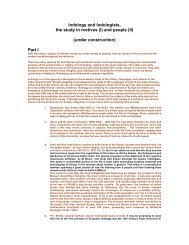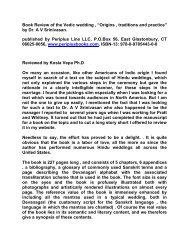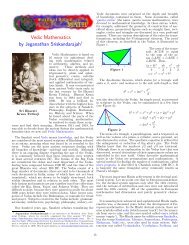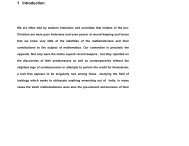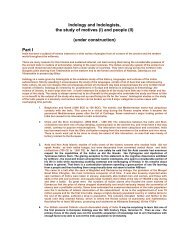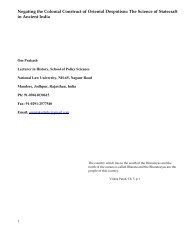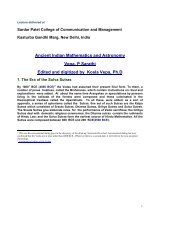The Dhaarmik Traditions - Indic Studies Foundation
The Dhaarmik Traditions - Indic Studies Foundation
The Dhaarmik Traditions - Indic Studies Foundation
Create successful ePaper yourself
Turn your PDF publications into a flip-book with our unique Google optimized e-Paper software.
Chapter 5<br />
<strong>The</strong> Essential teachings of the Bhagavad Gita<br />
5.1 Introduction<br />
भगवद् गीता<br />
<strong>The</strong> discourse on the Bhagavad Gita begins before the start of the climactic battle at<br />
Kurukshetra. It begins with the Pandava Prince Arjuna, as he is beset with doubt on<br />
the battlefield. Realizing that his enemies are his own relatives, beloved friends, and<br />
revered teachers, he turns to his charioteer and guide, Sri Krishna (an avatar of Sri<br />
Vishnu), for advice.<br />
Sri Krishna counsels Arjuna, beginning with the tenet that the soul is both eternal and<br />
immortal. Any 'death' on the battlefield would involve only the shedding of the body<br />
but the inner soul is permanent. Sri Krishna goes on to expound on the yogic paths of<br />
devotion (Bhakti), action (Karma), meditation (Raja) and knowledge (Jnana).<br />
Fundamentally, the Bhagavad Gita proposes that true enlightenment comes from<br />
growing beyond identification with the Ego, the 'False Self', and that one must identify<br />
with the Truth of the immortal Self, (the soul or Atman). Through detachment from the<br />
material sense of Ego, the Yogi, or follower of a particular path of Yoga, is able to<br />
transcend his illusory mortality and attachment from the material world and enter into<br />
the realm of the Supreme.<br />
To demonstrate his divine nature, Krishna grants Arjuna the boon of cosmic vision<br />
(albeit temporarily) and allows the prince to see His 'Universal Form'. He reveals that<br />
He is fundamentally both the ultimate essence of Being in the universe, and also its<br />
material body. This is called the Vishvarupa/Viratrupa.<br />
<strong>The</strong> Gita refers to the war as Dharma Yuddha, meaning a just war. Chapter 4, verse 7,<br />
clearly states that God takes on incarnations to establish righteousness in the world.<br />
99



